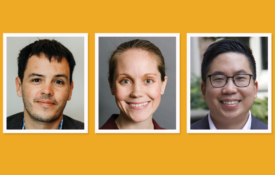-
Enhance Mental Health With a Culture of Gratitude
Work contributes significantly to mental health. Based on everything from assignments and responsibilities to relationships with leaders and colleagues, work makes a difference in how people feel physically, cognitively and emotionally. You can enhance your own mental health and your company can play a role as well by ensuring you have a sense of purpose, performing as well as you can and seeking opportunities for growth. But another way to nurture and sustain mental health is through something unexpected: gratitude. You can foster gratitude for yourself, and organizations can cultivate cultures of gratitude—and these will have positive effects for people as well as for business.
-
Why Do We Have Eyebrows and Other Types of Facial Hair?
We humans seem to have an on-again, off-again relationship with facial hair. Prehistoric cave drawings reveal the myriad tools our ancient ancestors used to shave: shark’s teeth, sharpened flints and even clam shells. Nowadays, beards are back in style and people are taking a razor to their brows, instead. But is there a reason we evolved to have these hairy baubles in the first place? And, if so, what evolutionary advantage might we be throwing away for the sake of staying on trend? Turns out, researchers have a lot to say on the matter. Get their answers to why we have eyebrows, what eyelashes are for and why we grow beards. ...
-

Special Episode II: APS 2023 Spence Awardees on Sharing Minds, the Development of Learning, and Implicit Bias
Julian Jara-Ettinger, Emily Fyfe, and Calvin Lai discuss reading and sharing minds, the development of learning and its practical applications, and the importance of studying the gap between what people value and what people do.
-

Special Episode I: APS 2023 Spence Awardees on Fresh Starts, Time Perception, and the Well-being of Black Families
Riana Elyse Anderson, Ed O’Brien, and Hengchen Dai discuss how to study and improve the well-being and functioning of Black families, the importance of time in how people perceive progress, and how fresh starts can feel motivating.
-

Diversity Training: One Size Does Not Fit All
Diversity trainings as currently practiced are unlikely to change police behavior, suggests an analysis of a day-long training session designed to increase U.S. police officers’ knowledge of bias and use of evidence-based strategies to mitigate bias.
-
The Puzzling Gap Between How Old You Are and How Old You Think You Are
This past thanksgiving, I asked my mother how old she was in her head. She didn’t pause, didn’t look up, didn’t even ask me to repeat the question, which would have been natural, given that it was both syntactically awkward and a little odd. We were in my brother’s dining room, setting the table. My mother folded another napkin. “Forty-five,” she said. She is 76. Why do so many people have an immediate, intuitive grasp of this highly abstract concept—“subjective age,” it’s called—when randomly presented with it? It’s bizarre, if you think about it. Certainly most of us don’t believe ourselves to be shorter or taller than we actually are.

